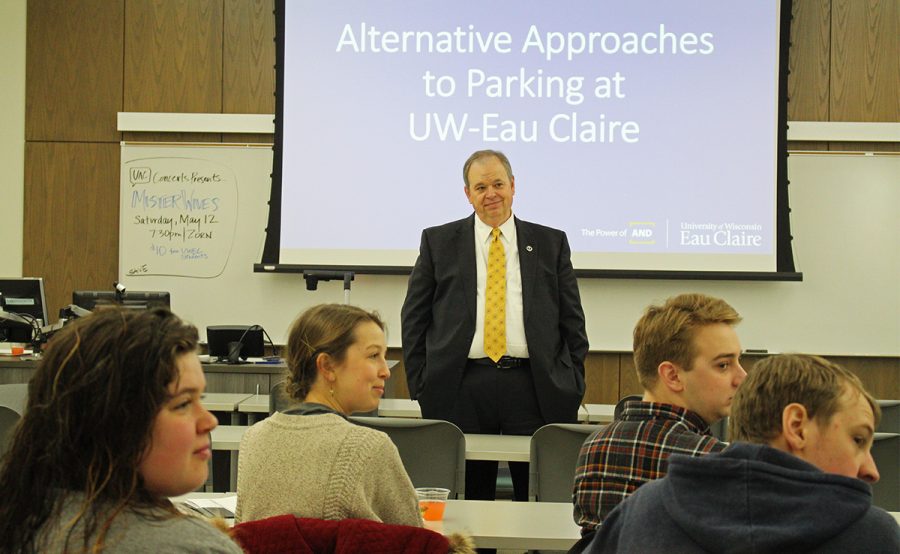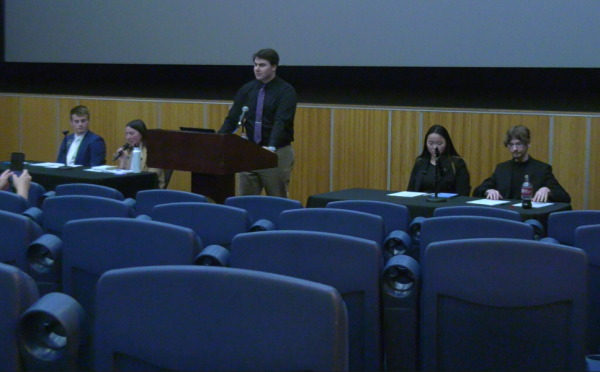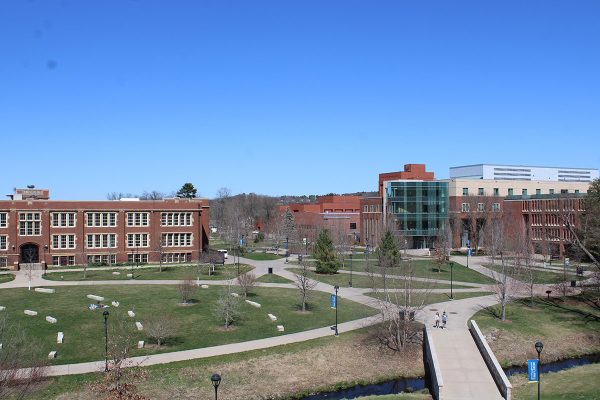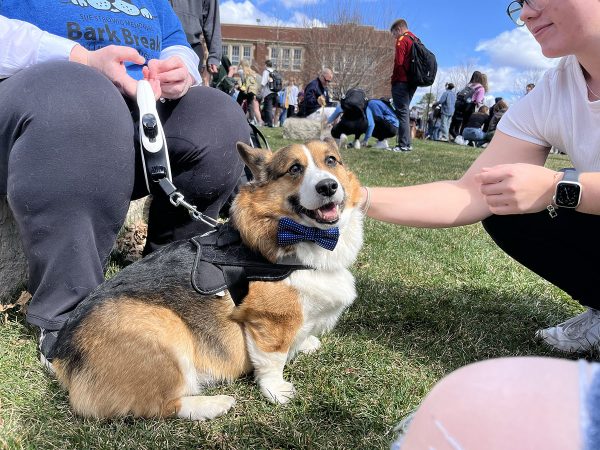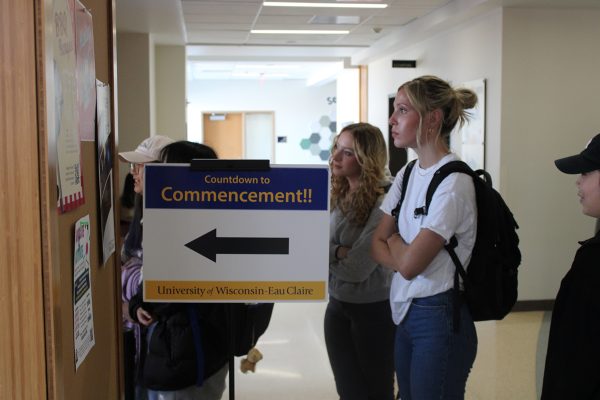Students provide input for Parking and Transportation Services
The Chancellor’s Roundtable on Thursday featured discussion about UW-Eau Claire’s parking
Photo by Kar Wei Cheng
Chancellor James C. Schmidt listens to student input during the latest Chancellor’s Roundtable event centered around parking on Thursday.
Student input was at the forefront of a dialogue about UW-Eau Claire’s parking and transportation systems at the Chancellor’s Roundtable on Thursday.
Parking at Eau Claire is an issue without a simple solution, said Eau Claire’s Parking Supervisor Allyson Wisniewski, which is why Parking and Transportation Services is seeking student ideas in their search for a solution.
“I appreciate this (discussion),” Wisniewski said, “This is not a black and white conversation; it’s not easy.”
Wisniewski said parking permit prices will increase next year by five percent. The prices will remain at the uptick for the following three years to pay for upcoming construction projects.
The permit-funded projects, to be completed during 2018-20, will mend, redo or create parking lots and provide upgrades to signage and parking meters.
Further, the Parking and Transportation office is tasked with enhancing public safety and meeting customer demand for convenience and affordability. However, these goals are challenged by fiscal and space constraints, among others.
To overcome these roadblocks, Wisniewski asked students for their input on parking and transportation solutions and took notes during discussion.
Parking
Currently, students can purchase a parking permit allowing them to park in stalls labeled with an “S” for $197 for one academic year. Eau Claire’s Parking and Transportation Services reports there are roughly 740 “S”-marked stalls on campus, while 1,100 students have “S” permits.
One student proposed building a parking ramp in place of Phillips Science Hall to increase the number of stalls on campus. Theoretically, the student suggested, parkers would pay by the hour or by meter.
“The answer isn’t quite as good as it sounds,” Chancellor James C. Schmidt said in response to the idea.
Phillips Science Hall’s location would be ideal for a ramp — eventually, a new science building will be built where the Katherine Thomas and Putnam residence halls stand — but the cost would be too significant to make it a reality, Schmidt said. A single parking permit for the ramp would need to cost $1,500 in order to pay off the structure’s price in 20 years.
Hillary Smith, a student senator, said she thinks parking permits for different parking lots and spots should all cost the same amount. It is not fair, Smith said, that people who are wealthy have an easier time parking than those who cannot afford to pay for a more expensive permit.
Conversely, Schmidt and other students expressed a need for hierarchical parking pass costs.
Kallie Friede, a graduate assistant for Gender & Sexuality Resource Center, said knowing one has a guaranteed spot could be helpful. For example, having an assigned spot in the Davies Student Center parking lot would be beneficial for those work long hours in nearby buildings.
Perhaps, Schmidt said, the high cost of a guaranteed parking permit could subsidize the cost of a normal parking spot.
Senator Bobbi Freagon said the university should incentivize carpooling to decrease the number of students who drive individually to campus. Another student added that creating parking stalls marked specifically for carpoolers could make parking lots more space-efficient.
“I know a lot of people who live within the means of walking or biking and just elect to drive because it’s more convenient,” Freagon said.
Parking permits could be paid for on a monthly basis, Alejandra Estrada, another student senator, said. That way, students who need passes for a few months would not have to pay for a full year, and a permit price increase wouldn’t be as financially detrimental.
Transportation
Students at the Roundtable said other forms of transportation, like walking, biking or busing, need refinement too.
Smith said more bike racks and a map of bike rack locations would encourage more students to bike to campus.
Michael Rindo, the assistant chancellor for facilities and university relations, responded to Smith’s concerns. He said the Garfield Avenue construction caused many bike racks to be removed. Once the project is complete, new racks will be erected.
A gap exists between the city bus nighttime and weekend schedule and the Campus Cab’s hours, Lydia Zipperer, a student senator, said. This is problematic, especially during the wintertime, she said.
“I am on campus, especially during the winter, from early in the morning until after dark,” Zipperer said, “and I live over on Lake Street, so walking home at night is very scary because it is not very lit.”
Several students echoed Zipperer’s concerns. Wisniewski said she will work with the city buses to create a busing schedule better suited to student needs.
Schmidt said he has been pushing the Eau Claire city council to address the public transportation issues students face.
Lauren Becker, a first-year student, said she had a hard time learning how to use Eau Claire’s transportation system. She believes many other students share the same struggle.
“It has to begin with students,” Becker said, “especially during their first year, to build good habits.”
As the Roundtable drew to a close, Wisniewski expressed her gratitude for the opportunity to hear students voice their opinions about parking and transportation.
“I heard a lot of really creative ideas,” Wisniewski said, adding she is open to considering more.
Parking and Transportation Services will finalize their plans for future changes in the coming months. Concerns, opinions and ideas about parking and transportation at Eau Claire can be emailed to [email protected].
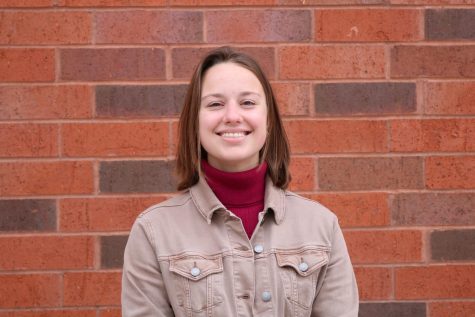
Neupert is a fourth-year journalism student at UW-Eau Claire. She is the executive producer of Engage Eau Claire on Blugold Radio Sunday. In her spare time, Neupert's working on becoming a crossword puzzle expert.

